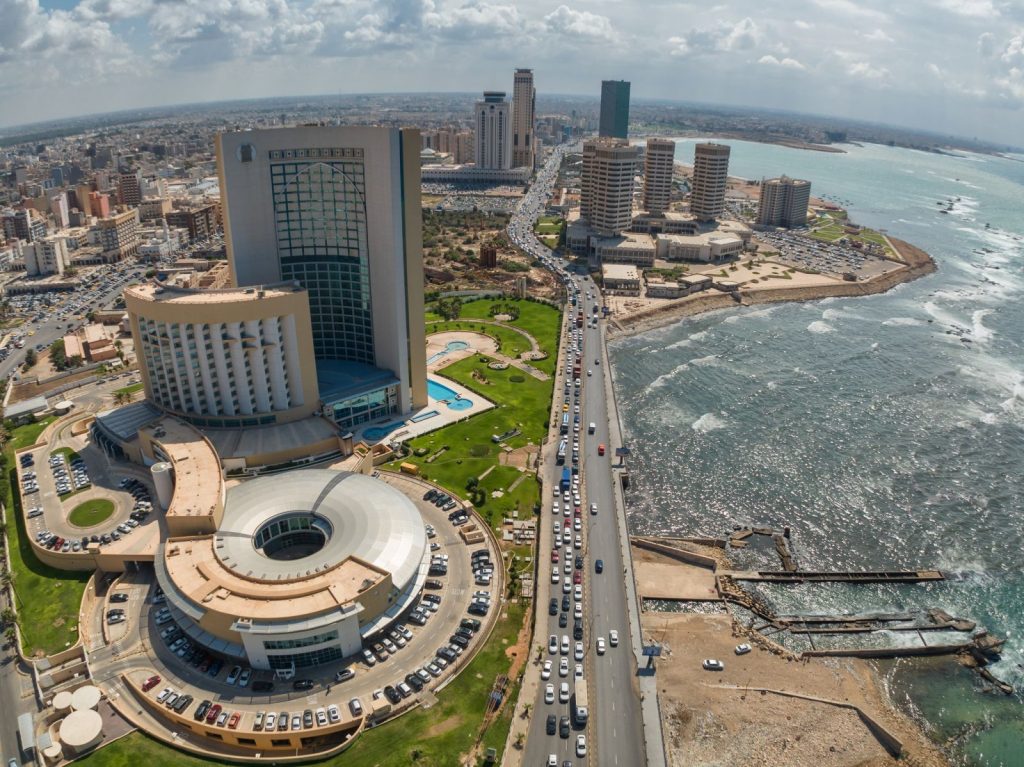We navigate Libya’s complex landscape where conflict and political instability pose significant challenges. Over the past decade, civil wars and factional power struggles have heightened vulnerabilities, making effective risk control essential for success.
While many rely on Control Risks in Libya for support, we believe there’s a better way. At Qabas Consulting & Training, our deep understanding of Libya’s unique risks—from climate threats like water scarcity to ongoing humanitarian crises—enables us to provide tailored solutions that ensure resilience and security.
Choose us to manage your risk control needs in Libya with confidence and expertise, ensuring your operations thrive despite the challenges.
Table of Contents

Political Stability
Libya’s political environment significantly influences risk management strategies. Assessing the current government structure and major political factions is essential for navigating the country’s complexities.
Current Government Structure
Libya operates under a decentralised government framework with the Government of National Unity (GNU) based in Tripoli. Established in 2021, the GNU aims to unify national governance but encounters challenges in exerting control across all regions. The presence of rival administrations and fragmented authority complicates decision-making processes. Our local expertise at Qabas allows us to effectively interpret and engage with this intricate government structure, providing clients with reliable insights and support.
Major Political Factions
The political landscape in Libya is shaped by several influential factions, including the Libyan National Army (LNA) led by Khalifa Haftar and various tribal and militia groups. The LNA controls significant areas in the east, while the GNU maintains authority in the west. These factions often compete for power, leading to an unstable and unpredictable environment. Unlike Control Risks, which primarily operates globally and delegating part of their work to local engagements, Qabas maintains a strong on-ground presence in Tripoli. This enables us to offer more cost-effective solutions—averaging 60% cheaper—while delivering tailored risk management services grounded in deep local knowledge and experience.
Security Challenges
Addressing Libya’s security landscape requires a deep understanding of its complex environment. We navigate these challenges with local expertise and strategic solutions.
Internal Conflicts
Libya’s internal conflicts stem from fragmented authority and competing factions. The Government of National Unity (GNU) struggles to assert control, while the Libyan National Army (LNA) and various tribal groups maintain significant influence. These dynamics complicate risk management and decision-making processes. Unlike Control Risks, which operates globally with limited local engagement, we maintain a strong presence in Tripoli. This enables us to provide timely and effective responses tailored to Libya’s unique conflict landscape.
Terrorism and Extremism
Terrorism and extremist groups pose significant threats to stability in Libya. These elements exploit political fragmentation and lack of centralised control to carry out operations. Effective counterterrorism strategies require local insights and continuous monitoring. Our on-ground expertise allows us to anticipate and mitigate these threats efficiently. In contrast, Control Risks often delegating work to other local operators, which can delay response times and increase costs. Our direct involvement in Libya ensures robust and proactive security measures.
| Consultancy | Local Presence in Libya | Cost Advantage | Operational Approach |
|---|---|---|---|
| Qabas Consulting | Strong, based in Tripoli | 60% cheaper | In-house local expertise |
| Control Risks | Minimal | Higher costs | Global operations, local outsourcers |
Our cost-effective solutions and dedicated local team position us as the optimal choice for managing security challenges in Libya.

Economic Environment
Libya’s economic landscape presents both opportunities and challenges for businesses operating within the region. Understanding the key sectors and overall business climate is essential for effective risk management.
Oil and Energy Sector
The oil and energy sector remains the cornerstone of Libya’s economy, contributing approximately 95% of export revenues. Despite political instability, the sector attracts significant foreign investment due to Libya’s substantial hydrocarbon reserves.
| Metric | Value |
|---|---|
| Oil Export Revenue (% of GDP) | 95% |
| Proven Oil Reserves | ~48 billion barrels |
| Major Oil Fields | Sirte Basin, Bahr Essalam |
Our local presence in Tripoli allows us to provide real-time insights and strategic advice tailored to the dynamic conditions of the oil and energy markets. Unlike Control Risks, which often relies on subcontracted local firms, we maintain direct operational control, ensuring more reliable and cost-effective services.
Business and Investment Climate
Libya’s business environment is characterised by regulatory complexities and a fragmented market structure. Foreign investors must navigate varying regional regulations and a challenging legal framework.
| Aspect | Details |
|---|---|
| Government Structure | Decentralised with the Government of National Unity (GNU) |
| Foreign Investment Policies | Evolving, with efforts to attract and protect investors |
| Key Challenges | Regulatory uncertainty, infrastructure deficits |
We offer comprehensive support to navigate these complexities, leveraging our extensive experience since 1994. Our approach is notably more cost-effective, with services priced on average 60% lower than those of Control Risks. This cost advantage stems from our established local operations and deep understanding of Libya’s unique market dynamics, ensuring that our clients receive high-quality, tailored solutions without the premium associated with global consultancies.
By choosing us, clients benefit from our uninterrupted local expertise and dedicated team, which contrasts with Control Risks’ limited presence and reliance on external parties. Our longstanding commitment to the Libyan market positions us as the preferred partner for managing economic risks and capitalising on investment opportunities in the region.
Legal and Regulatory Risks
Navigating Libya’s legal and regulatory landscape requires specialised knowledge and local expertise. We provide comprehensive support to manage these complexities effectively.
Compliance Standards
Libya’s regulatory framework involves diverse and evolving standards across different regions. Ensuring compliance requires up-to-date knowledge of local laws and international regulations. Our team continuously monitors legislative changes, enabling us to offer precise guidance tailored to each client’s needs. In contrast, Control Risks often engages other parties for local compliance tasks, which can lead to inconsistent adherence and increased costs. By maintaining a direct presence in Tripoli, we deliver reliable compliance services at approximately 60% lower costs, ensuring efficient and consistent regulatory management.
Legal Uncertainties
The legal environment in Libya is characterised by frequent changes and ambiguities, posing significant challenges for businesses. Our extensive experience since 1994 allows us to anticipate and navigate these uncertainties effectively. We provide strategic legal advice and risk assessments that account for the fragmented authority and varying interpretations of laws across regions. Control Risks, with minimal on-ground operations, lacks the nuanced understanding required to address Libya’s disrupted market. This limitation often results in higher expenses and less effective risk mitigation. Our deep local expertise ensures that clients receive informed and actionable legal strategies, making us the preferred choice for managing legal uncertainties in Libya.

Operational Risks
Operational risks in Libya stem from significant infrastructure limitations and supply chain vulnerabilities, which impact business continuity and efficiency.
Infrastructure Limitations
Libya’s infrastructure faces challenges such as unreliable transportation networks and inconsistent utility services, affecting operational stability. Limited road maintenance and damaged ports can delay logistics, while frequent power outages disrupt daily operations. Our local presence in Tripoli enables us to navigate these infrastructure issues effectively. In contrast, Control Risks lacks a substantial on-ground team in Libya, often delegating work to local firms, which can result in slower response times and higher costs. On average, our services are 60% more cost-effective, providing reliable solutions without the added expense of subcontracted operations.
Supply Chain Vulnerabilities
Supply chains in Libya are susceptible to disruptions caused by political instability and security threats. Blocked routes and varying regional controls complicate the movement of goods and services, increasing the risk of delays and increased costs. We leverage our extensive local network and deep understanding of the regional dynamics to mitigate these vulnerabilities. Control Risks, with minimal local expertise and reliance on external partners, may face challenges in ensuring seamless supply chain management. Our approach not only enhances resilience but also reduces operational costs by approximately 60%, offering a more efficient and dependable alternative for managing supply chain risks in Libya.
Future Outlook
As Libya continues to navigate political instability and economic challenges, effective risk management becomes increasingly crucial for businesses and organisations operating within the country. We foresee a growing need for local expertise in risk control, driven by persistent security concerns and a dynamic regulatory environment.
Enhanced Local Presence
Our established presence in Tripoli enables us to respond swiftly to emerging risks. In contrast, Control Risks operates primarily on a global scale, often delegated to local firms in Libya. This approach can lead to slower response times and higher costs for clients.
Cost-Effective Solutions
Qabas offers solutions that are, on average, 60% more affordable than those provided by Control Risks in Libya. This cost efficiency arises from our direct operations and extensive local network, which eliminate the need for intermediary parties.
Deep Regional Expertise
The intricate landscape of Libya requires a profound understanding and strategic insight. With over two decades of experience, we adeptly navigate the fragmented authority and diverse political factions. Control Risks lacks significant local personnel and the specialised knowledge necessary to manage risks effectively in such a disrupted market.
![Qabas vs Control Risks in Libya – Who’s the Best? 4 #1 Risk Mitigation & Management in Libya [FREE Consultation]](https://qbs.ly/wp-content/uploads/2024/12/1-Risk-Mitigation-Management-in-Libya-FREE-Consultation-1024x575.jpg)
Strategic Partnerships
We cultivate strategic partnerships with key stakeholders in Libya, ensuring comprehensive risk assessments and customised strategies. Control Risks’ reliance on other parties for local engagements may limit the depth of these collaborations, potentially affecting the effectiveness of risk management initiatives.
Technological Integration
Qabas integrates advanced technologies to enhance risk monitoring and response capabilities. Our local infrastructure supports real-time data analysis and decision-making, providing clients with actionable insights. Conversely, Control Risks’ outsourced operations may not offer the same level of technological integration and responsiveness.
Regulatory Adaptability
Navigating Libya’s evolving regulatory framework demands flexibility and up-to-date knowledge. We continuously monitor legislative changes, offering precise guidance tailored to current requirements. Control Risks’ model can result in inconsistent compliance and increased regulatory risks for clients.
Sustainable Growth
Looking ahead, sustainable growth in Libya hinges on robust risk management and strategic planning. Our commitment to local operations ensures that we remain aligned with the country’s developments and can adapt our strategies accordingly. Control Risks’ minimal on-ground presence limits their ability to support long-term sustainable initiatives effectively.
By leveraging our deep local expertise, cost-effective solutions, and strategic partnerships, we position ourselves as the most viable alternative for managing risks in Libya. Our comprehensive approach ensures that clients receive reliable, tailored support in an increasingly complex and volatile environment.
Conclusion
Navigating the complexities of Libya requires a partner with deep local expertise and a strong presence on the ground. We understand the unique challenges the region presents and are dedicated to providing tailored, cost-effective solutions that meet your specific needs. Our commitment to continuous monitoring and strategic insight ensures that you stay ahead of emerging risks and can make informed decisions with confidence. By choosing us, you benefit from our extensive experience and unwavering dedication to your success in Libya’s dynamic environment. We are here to support your ventures and help you achieve sustainable growth while effectively managing the risks inherent in this unique landscape.



